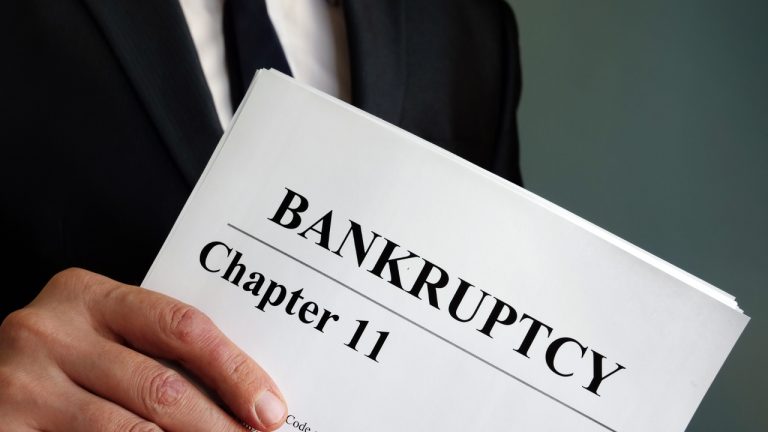 According to the now-defunct crypto lender Voyager, Binance US sent a letter to the company “terminating the asset purchase agreement.” While the announcement was “disappointing” for Voyager, the firm maintained that its customers would still be receiving their cash and crypto through a “direct distribution” via the Voyager platform. Voyager’s Asset Purchase Agreement With Binance […]
According to the now-defunct crypto lender Voyager, Binance US sent a letter to the company “terminating the asset purchase agreement.” While the announcement was “disappointing” for Voyager, the firm maintained that its customers would still be receiving their cash and crypto through a “direct distribution” via the Voyager platform. Voyager’s Asset Purchase Agreement With Binance […]
Millions of dollars worth of electrical equipment will be transferred to the crypto miners' exclusive energy negotiator to settle a payments dispute.
A $20 million settlement between Bitcoin (BTC) miner Core Scientific and its energy negotiator Priority Power Management has been approved by the judge in Core Scientific’s bankruptcy proceedings.
In a March 20 filing in the United States Bankruptcy Court for the Southern District of Texas, Judge David Jones signed off on allowing Core Scientific to transfer around $20.8 million worth of equipment to Priority Power.
The companies had been in a dispute over two Texas-based mining facilities that were slated to receive 1,000 megawatts of power between them to increase Core Scientific’s mining capacity.

In a declaration filed on March 19, Core Scientific executive Michael Bros said it brought on Priority Power in June 2021 to exclusively manage, consult and develop infrastructure to fulfil its energy needs “on a short ramp-up schedule.”
However, Bros said that by May 2022, “it became clear that the Facilities would not receive the anticipated power load,” and Core Scientific stopped making payments to Priority Power, which “suffered significant losses.”
Priority Power then claimed Core Scientific owed it around $30 million for the work it had performed before the miner filed for Chapter 11 bankruptcy in December last year.
Related: Crypto mining in 2023 — Is it still worth it?
The judge’s decision means that Priority Power will be given $20.8 million worth of equipment from the now-bankrupt firm, including electrical equipment such as power transformers and breakers.
The deal also promises that Core Scientific “will introduce” Priority Power “to any acquirer” of its sites in Texas, so that it can potentially go into an energy management and consulting agreement with the new owners.
Priority Power will also get to keep $514,000 earned by curtailing power for Core Scientific. The miner will also reimburse the firm “for legal fees and out-of-pocket expenses up to $85,000.”
Core Scientific filed for bankruptcy due to pressure from falling company revenues, low Bitcoin prices and litigation costs against the bankrupt crypto lender Celsius.
Core Scientific has been forced to hand over equipment before, making made a deal in February with New York Digital Investment Group to pay off a $38.6 million debt by handing over more than 27,000 mining rigs that were used as collateral.

Insider sources reportedly described the bonus pool as “modest,” adding that the stock held by senior execs had been “rendered worthless” following Silicon Valley Bank UK arm's "near-collapse.”
Silicon Valley Bank UK (SVB UK) has granted millions of pounds in employee bonuses, just days after it was rescued by global banking giant HSBC for just 1 British pound, according to unnamed sources.
In a March 18 Sky News report citing unnamed sources, it was reported that payouts to SVB UK staff and senior executives were signed off "earlier this week" by HSBC UK Bank – the institution which acquired SVB UK for 1 British pound ($1.22 USD) on March 13.
It was reportedly "unclear" how much had been awarded to SVB UK’s CEO, Erin Platts, "or her senior colleagues," however the sources described the bonus pool as “modest,” and said that it totalled “between £15m and £20m" (approximately $18.26 million and $24.35 million USD).
While the insiders reportedly noted that if SVB UK “not been acquired solvently,” the bonuses wouldn’t have “been paid this week,” one insider reportedly “pointed out” that the stock held by senior executives and other employees had been “rendered worthless” by SVB UK’s near-collapse.
Related: Failed tech bank SVB held over $5B for prominent crypto VCs: Report
Another insider reportedly added that the bonus payments were “a signal of HSBC’s confidence in the talent base” at SVB UK, and was to honor “previous agreed payments” in an effort to “retain key staff.”
SVB UK previously stated in a March 17 tweet that it was "delighted" to now be part of HSBC, after 14 years of supporting and "growing the UK's innovative economy."
With 14 years of supporting & growing the UK's innovation economy, @SVB_UK is delighted to now be part of @HSBC, joining a successful global organisation to fuel our client's growth and ours. #UKTech #SVBUK #Startups #HSBChttps://t.co/MNUl57S33Z
— SVB UK (@SVB_UK) March 16, 2023
This comes after the Bank of England shut down the operations of SVB UK on March 10, stating that it had a “limited presence,” and no “critical functions” supporting the financial system.
The statement declared that SVB UK will “stop making payments or accepting deposits,” as the BoE intended to apply to the court to place SVB into a “Bank Insolvency Procedure.”
Meanwhile, SVB's United States banking arm has been taken into government ownership and its holding company, SVB Financial Group, filed for Chapter 11 bankruptcy protection on March 17, as it seeks buyers for its other assets.
SVB Group chief restructuring officer, William Kosturos, stated that the Chapter 11 process will allow SVB Financial Group to “preserve value as it evaluates strategic alternatives for its prized businesses and assets.”
Kosturos emphasized that SVB Capital and SVB Securities will continue to operate, led by their respective independent teams.
 On March 17, 2023, SVB Financial Group, the parent company of Silicon Valley Bank, filed for Chapter 11 bankruptcy protection in the Southern District of New York. The company stated that it is no longer associated with Silicon Valley Bank (SVB) after the Federal Deposit Insurance Corporation (FDIC) placed it into receivership last week. 3 […]
On March 17, 2023, SVB Financial Group, the parent company of Silicon Valley Bank, filed for Chapter 11 bankruptcy protection in the Southern District of New York. The company stated that it is no longer associated with Silicon Valley Bank (SVB) after the Federal Deposit Insurance Corporation (FDIC) placed it into receivership last week. 3 […]
The ruling allows the crypto lender a path out of its bankruptcy, but it still has to undertake some due diligence with Binance US before the sale is final.
Bankrupt cryptocurrency lender Voyager Digital has won court approval to sell over $1 billion of its assets to Binance US.
The approval was granted by United States Bankruptcy Judge Michael Wiles on Mar. 7, which came after four days of arguments presented by Voyager and the U.S. Securities Exchange Commission (SEC).
Wiles said he would give the trading platform permission to close the Binance US sale and issue repayment tokens to impacted Voyager customers, which would give them back approximately 73% of what they're owed.
Wiles rejected a series of arguments by the SEC that the redistribution of the funds from Voyager to Binance.US would violate U.S. securities laws, according to a Mar. 7 report from Bloomberg:
“I cannot put the entire case into indeterminate deep freeze while regulators figure out whether they believe there are problems with the transaction and plan."
Peter M. Aronoff, a lawyer with the Department of Justice (DOJ) said it's considering appealing Wiles' decision.
The judge's decision comes just over a week after 97% of 61,300 Voyager account holders were found to be in favor of the current Binance.US restructuring plan, according to a Feb. 28 filing.
This is a developing story, and further information will be added as it becomes available.

The SEC claims the transactions involved with redistributing the funds to impacted Voyager account holders will trigger U.S. securities laws.
The United States Securities Exchange Commission (SEC) won’t be allowed to fine executives involved in Voyager Digital should it end up issuing bankruptcy tokens to help repay impacted customers, bankruptcy judge Michael Wiles has said.
The comments from Wiles came on Mar. 6, the third day of hearings regarding a plan by Voyager to issue a repayment token and sell $1 billion of assets to Binance.US.
The SEC earlier argued that the repayment token would constitute an unregistered security offering, while Binance.US is operating an unregulated securities exchange.
In a supplemental objection statement, it also objected to a legal protection which stated that no U.S. agency, including the SEC, will be able to bring “any claim against any Person on account of or relating to the Restructuring Transactions.”
Essentially, this means that executives and restructuring advisers involved in Voyager’s bankruptcy would be shielded from lawsuits if they implement the bankruptcy plan, as long as it is court-approved.

While the SEC described these provisions as “extraordinary” and “highly improper,” Wiles explained that giving the SEC such authority would “leave a sword hanging over the heads of anybody who’s going to do this transaction,” according to a Mar. 6 Bloomberg report, stating:
“How can a bankruptcy case or any court proceeding function with that kind of suggestion?”
SEC lawyer Therese Scheuer argued however that the legal protections are so broad that Voyager employees and lawyers would have permission to violate securities laws. After debate, Voyagers lawyers agreed to narrow the scope of legal releases, according to Bloomberg.
Related: Voyager victim calls for trustee to seize control of the estate
The trading platform officially filed for bankruptcy on Jul. 5 in an attempt to restructure the firm and “return value” back to over 100,000 customers.
The court has been considering a restructuring plan to bring Voyager out of Chapter 11 bankruptcy which would first announced on Dec. 19.
The plan would see crypto exchange Binance.US acquire its assets for $1.02 billion — an option Voyager said at the time represented the “highest and best bid for its assets.”
The SEC objected to the sale on Feb. 22, claiming aspects of the restructuring plan could breach securities laws. The regulator was then criticized over its ambiguous reasoning for the objection in a Mar. 2 court hearing.
A Feb. 28 court filing found that 97% of 61,300 polling Voyager account holders were in favor of the current Binance.US restructuring plan.


A U.S. judge scolded the SEC over its non-specificity on its objection to Voyager’s restructuring deal and asked for specifics on its concerns.
The bankruptcy judge on Voyager Digital’s case has reportedly scolded the United States securities regulator over its ambiguous reasoning for objecting to the crypto lending firm’s proposed sale to Binance.US.
At a Mar. 2 hearing in a New York court, U.S. bankruptcy judge Michael Wiles said the Securities and Exchange Commission (SEC) had basically asked to “stop everybody in their tracks” without explaining how to address concerns it had over the deal according to a Reuters report.
The court was considering a restructuring plan announced on Dec. 19 last year to bring Voyager out of Chapter 11 bankruptcy that would see crypto exchange Binance.US acquire its assets for $1.02 billion — an option Voyager said at the time represented the “highest and best bid for its assets.”
The SEC however filed an objection to the sale on Feb. 22 claiming aspects of the restructuring plan could breach securities laws, namely the crypto transactions that will need to happen to rebalance funds to redistribute to Voyager account holders.
In court, SEC attorney William Uptegrove offered a reserved answer to Judge Wiles when asked if the regulator believes the plan violated the law, saying:
"We can't take a position at this point. The SEC is a deliberative body, and its process is a nonpublic one by federal law."
Wiles hit back saying "deliberative is one thing, but what have you done?" and added, "if there are reasons to be concerned here, I need to hear specifics."
⚠️ Judge Wiles slamming the SEC rep about their objection. ⚠️
— VGX Heroes (@VGX_Heroes) March 2, 2023
Says, (paraphrase) "You're asking the debtor to prove that the cryptos being transacted are not securities, but you've given no regulatory guide as to what that is."
The sale requires court approval, along with the go-ahead from the SEC and the Committee on Foreign Investment in the United States (CFIUS) which is probing the deal to review if it will entail a foreign investment and raise national security concerns.
Judge Wiles is set to hear continued arguments on the bankruptcy plan on Mar. 3.
Related: FTC announces investigation into Voyager’s ‘deceptive and unfair marketing’ of crypto
The proposed Binance.US plan would transfer Voyager customers to the crypto exchange, who would be able to withdraw their funds for the first time since the platform filed for bankruptcy in July last year.
Customers would reportedly recover over 70% of their deposited value as at the time of the bankruptcy, in a poll of 61,300 account holders with claims against the crypto lender, the plan was favored by 97% of Voyager’s customers.
 FTX debtors have filed a motion with the court requesting to dismiss its Turkish subsidiaries from the Chapter 11 bankruptcy proceedings. The defunct crypto exchange’s lawyers believe dismissing the entities “is in the best interests” of creditors, and FTX debtors do not believe Turkish authorities “or any liquidator” in the country will cooperate with officials […]
FTX debtors have filed a motion with the court requesting to dismiss its Turkish subsidiaries from the Chapter 11 bankruptcy proceedings. The defunct crypto exchange’s lawyers believe dismissing the entities “is in the best interests” of creditors, and FTX debtors do not believe Turkish authorities “or any liquidator” in the country will cooperate with officials […]
A lawyer for Genesis is optimistic it can resolve creditor disputes before the week is out while the firm could exit bankruptcy proceedings in four months.
A lawyer for bankrupt crypto lending firm Genesis is optimistic the firm can resolve its creditor disputes as early as this week and the company could come out of Chapter 11 proceedings by late May.
Genesis’ lawyer Sean O'Neal made the comments at a Jan. 23 initial hearing at the United States Bankruptcy Court for the Southern District of New York, according to a Reuters report.
He added Genesis had "some measure of confidence" it would resolve disputes with creditors by the end of the week and, if needed, would look for the judge to install a mediator, but said:
"Sitting here right now, I don't think we're going to need a mediator. I'm very much an optimist."
Genesis filed for Chapter 11 bankruptcy on Jan. 19. At the time it already had a restructuring plan along with a path pursuing a “sale, capital raise, and/or an equitization transaction" so it could potentially “emerge under new ownership.”
The bankruptcy comes nearly two months after Genesis suspended withdrawals in November 2022 citing market turbulence caused by the bankruptcy of crypto exchange FTX.
A series of "first-day" motions, standard in bankruptcy proceedings, were granted by Judge Sean Lane to Genesis which included allowing the firm to pay employees and vendors.
Lane added Genesis did not need to reveal customer names on its creditor's list, citing privacy concerns. Lane even suggested the lender warn users about possible phishing scams if the names are later made public.
Genesis said it will sell its assets at auction with a plan to exit its bankruptcy in a little under four months on May 19.
Related: BlockFi exec argues bankruptcy court should approve bonuses to retain talent
It reported having just over $5 billion in assets and liabilities and owes over 100,000 creditors at least $3.4 billion. Genesis’ withdrawal suspension last year impacted users of a yield-bearing product it managed called “Earn” from the Gemini exchange.
Gemini is Genesis’ largest creditor and is owed nearly $766 million.
Its largest debtor was its parent company, Digital Currency Group (DCG), which owes Genesis around $1.65 billion inclusive of $575 million of loans due in May and a $1.1 promissory note maturing in 10 years' time.
Even though DCG is facing its own financial troubles — the bankruptcy did not include DCG. Similarly, the Genesis entities handling derivatives, spot trading, broker-dealer and custody are not part of the proceedings and are continuing operations according to Genesis.

The co-founder of US-based exchange giant Gemini is announcing his exchange will sue the parent company of bankrupt crypto lender Genesis. Yesterday, Genesis Global Capital, LLC filed for Chapter 11 bankruptcy after weeks of speculation that they could do so. The Gemini co-founder and his twin brother Tyler Winklevoss have been in a public social media spat with Genesis’ […]
The post Cameron Winklevoss Says Gemini Will Sue Digital Currency Group and Barry Silbert As Genesis Files for Bankruptcy appeared first on The Daily Hodl.